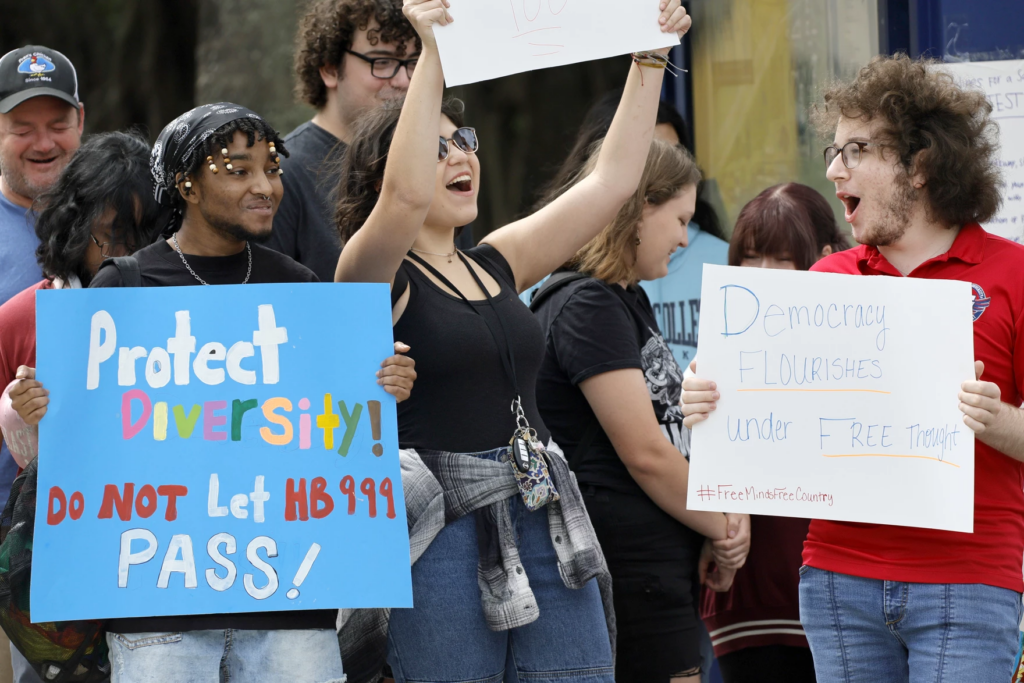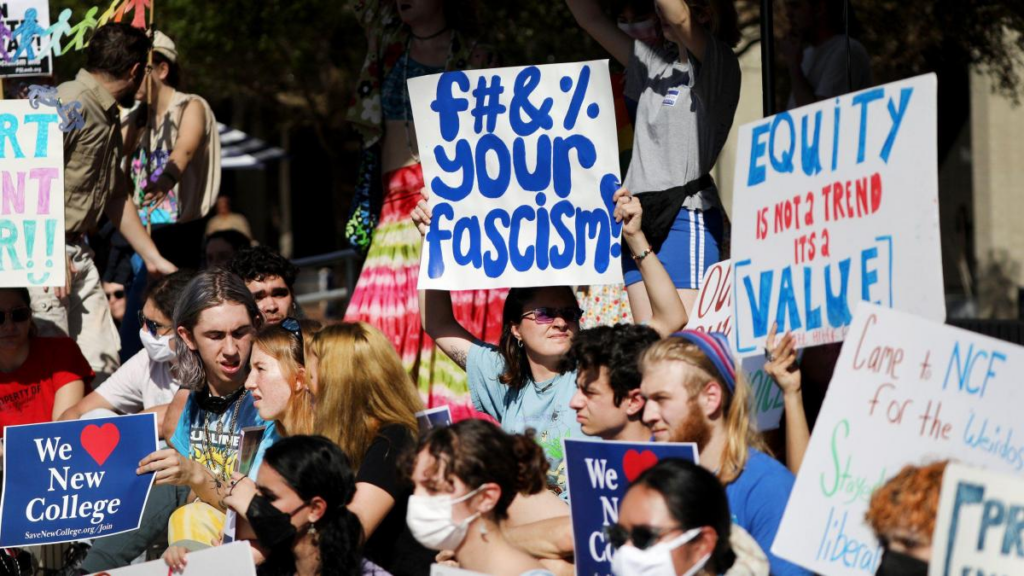Last month in West Palm Beach, Gov. Ron DeSantis criticized diversity, equality, and inclusion (DEI) programs.
“In Florida, we will not back down to the woke mob, and we will expose the scams they are trying to push onto students across the country,” stated DeSantis. “Florida students will receive education, not political indoctrination.”
As part of his effort to reform publicly funded higher education, DeSantis, a potential 2024 Republican presidential candidate, has started dismantling university DEI programs.
This year, the Republican-majority Florida Legislature followed the governor’s lead and introduced DEI reform legislation for all 12 public colleges.
The Senate measure SB 266 was altered to remove diversity, equity, and inclusion components, while the House bill H.B. 999 to abolish DEI initiatives is moving forward.
DEI initiatives have been part of higher education since the 1960s civil rights movement and have increased diversity of thought and enrollment success of underrepresented populations in campus clubs, support groups, recruitment, and outreach.
Critics say DEI schemes erode merit and equality.
“Instead of being unifying, we see it as divisive and an attempt to cancel and censor those that don’t agree,” said Ray Rodrigues, Chancellor of the State University System of Florida, during the West Palm Beach roundtable.
“It’s become a means to advocate a political ideology of the left,” he remarked. “And, it has ignored merit and instead sought to provide equal outcomes not based on the merit of the individual or the work but on their physical characteristics, which is exclusionary not inclusive.”

Florida and Texas are among the dozen states considering outlawing similar programs. Legislators and lawmakers in Florida are debating if these programs are a smart use of public dollars, if they work, or if they divide employees, students, and departments.
New College of Florida closed its DEI office.
Palm Beach Atlantic University, a private Christian institution in Palm Beach County, terminated the contract of a longtime English teacher who taught black literature. A parent accused him of “indoctrinating” children.
H.B. 999 would bar public institutions from using state or federal funds for DEI or political action programs. It would also ban programs that show race, gender, or other preferences.
“Republicans have made [DEI] the new boogeyman or their new buzzword for wokeness,” South Florida Democrat State Sen. Shevrin Jones told WLRN. It’s always been there.”
Jones taught AP Chemistry and Biology at Florida Atlantic University high school in Boca Raton before entering politics.
“This new notion that these types of programs in colleges and universities are somehow turning children into quote unquote activists is just totally a mischaracterization of diversity equity and inclusion,” he told WLRN.

Jones said DEI programs support first-generation college students, fund outreach initiatives, provide anti-racism workshops, and pay administrators to run them.
Jones toured Florida’s 12 public universities in 2021 as vice head of the Senate Appropriations Committee on Education and concluded that schools were helping close the equity gap.
“That’s not wokeness, that’s school support to help their students on their campus to make sure that everyone feels like they belong there,” he said.
Florida public colleges reported spending approximately $35 million on DEI programs annually. State funds account for $21 million.
Conservative Florida politicians doubt the money is being spent. The University of Florida spent nearly $1 million on four DEI office personnel, $780,000 of which was state money.
Christopher Rufo, a Manhattan Institute senior fellow and New College of Florida trustee, attended the DeSantis roundtable discussion “Education Not Indoctrination.”
I think we should examine the details. “Get past the Orwellian word games that sound good in theory and really understand what these offices do and is it a good use of public resources.”
Rufo is often credited with sparking right-wing fury against critical race theory, a legal phrase used to teach about slavery. He publishes military visions of New College’s future on social media.
Rufo has called the new public institution trustees the “landing team,” declaring, “We got over the wall,” and referring to an operation to “recapture” the college.
The Philadelphia-based charity Foundation for Individual Rights and Expression promotes academic free speech, and Joe Cohn told WLRN that legislators are entitled to examine DEI spending.
It’s exploding. “There’s data that shows the percentage of money dedicated towards the administrative arm of institutions is exponentially growing, while the resources dedicated to faculty are shrinking vastly,” Cohn added.
Better spent.
DEI is multifaceted. Florida colleges have DEI programs. The University of Florida College of Medicine has a Center for Inclusion and Multicultural Engagement and an Office for Diversity and Health Equity.
Republican state Rep. Alex Andrade, who sponsored H.B. 999, claims that DEI officials are sending the incorrect message by promoting particular ideas. He thinks these programs waste money.
“I think the state benefits from reallocating it to more beneficial pursuits,” Andrade added.
DEI initiatives comprise 1% of school expenditures. According to documentation in the staff analysis of the bill, certain Florida public colleges fund DEI programs themselves.

Florida Atlantic University in Boca Raton has 20% Black and 27% Hispanic students. Last year, the institution spent $900,000 on DEI efforts, including administrative staff, student success programs, workshops, seminars, and social events. State funding exceeded $640,000.
H.B. 999 goes beyond finance.
The law prohibits coursework that “distorts significant historical events or that uses instruction from critical theory.”
“Racism and Anti-Racism” and “Gender and Climate Change” at Florida Atlantic University are state-funded.
Cohn, from the organization Foundation for Individual Rights and Expression, said the bill would jeopardize other comparable courses.
The measure has several complex aspects. “For example, it prevents certain majors from existing on campus all targeted because they espouse views that the majority in the Florida legislature dislikes,” Cohn said.
The law prohibits “solicitation of pledges or commitments to viewpoints related to DEI, CRT, or any political identity or ideology, as part of any hiring, promotion, admission, disciplinary, or evaluation process.”

Political tests?
Political litmus tests—used to determine principles and morals—would be banned.
“It’s inappropriate for institutions to be imposing any political litmus tests in either direction on any issues,” Cohn says.
FAU School of Communications & Multimedia professor Christopher Robe teaches film. “There’s a confusion between talking about subjects and indoctrinating subjects,” he remarked. That’s different, right?
He informed WLRN that UFF opposes this law.
I teach pro-KKK Birth of a Nation. My class does not promote the KKK. But it’s crucial to acknowledge the film’s historical significance and its impact on Hollywood and cinema. It’s childish. This idea that mentioning it implies support.”
Jay Goodman, a sophomore music composition student at Florida Atlantic University, helped write a resolution against the law.
It contradicts college’s mission to educate and open minds. The government shouldn’t restrict ideas.

